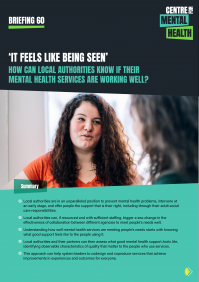How can local authorities know if their mental health services are working well?
Andy Bell and Amy Pollard
Local authorities play a crucial role within the mental health ecosystem and hold levers that can transform the lives of adults with mental health difficulties. But how do local councils and their partners in the NHS know if the mental health services they fund are working from the perspectives of the people who use them?
Centre for Mental Health conducted research to inform the work of the Care and Health Improvement Programme, funded by the Department of Health and Social Care (DHSC) and jointly delivered by the Local Government Association (LGA) and the Association of Directors of Adult Social Services (ADASS). This research focused on two core questions relating to the role of local authorities that commission and provide adult social services in assessing and meeting people’s mental health needs:
- What does it look and feel like when support effectively considers people’s social and psychological wellbeing as part of mainstream assessments and care planning?
- What does it look and feel like when there is good collaboration in the commissioning and planning of mental health services and support?
We explored these questions in interviews and discussions with service users, carers and cross-sector professionals in mental health and social care. Through these conversations, we have produced a series of statements or criteria which services could use to assess whether they are effectively collaborating to support people’s needs.
This briefing highlights the need for a set of benchmarks for ‘what good feels like’ with ‘what good looks like’ to give local authorities and their partners a holistic and robust means to assess the quality of services, which complements their conventional metrics.






